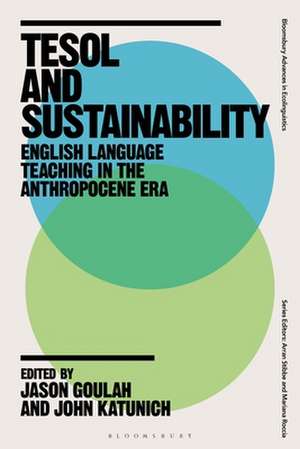TESOL and Sustainability: English Language Teaching in the Anthropocene Era: Bloomsbury Advances in Ecolinguistics
Editat de Dr Jason Goulah, Dr John Katunichen Limba Engleză Paperback – 17 noi 2021
| Toate formatele și edițiile | Preț | Express |
|---|---|---|
| Paperback (1) | 197.05 lei 6-8 săpt. | |
| Bloomsbury Publishing – 17 noi 2021 | 197.05 lei 6-8 săpt. | |
| Hardback (1) | 714.51 lei 6-8 săpt. | |
| Bloomsbury Publishing – 13 mai 2020 | 714.51 lei 6-8 săpt. |
Preț: 197.05 lei
Preț vechi: 257.48 lei
-23% Nou
Puncte Express: 296
Preț estimativ în valută:
37.71€ • 39.22$ • 31.13£
37.71€ • 39.22$ • 31.13£
Carte tipărită la comandă
Livrare economică 14-28 aprilie
Preluare comenzi: 021 569.72.76
Specificații
ISBN-13: 9781350294516
ISBN-10: 1350294519
Pagini: 216
Dimensiuni: 156 x 234 mm
Greutate: 0.3 kg
Editura: Bloomsbury Publishing
Colecția Bloomsbury Academic
Seria Bloomsbury Advances in Ecolinguistics
Locul publicării:London, United Kingdom
ISBN-10: 1350294519
Pagini: 216
Dimensiuni: 156 x 234 mm
Greutate: 0.3 kg
Editura: Bloomsbury Publishing
Colecția Bloomsbury Academic
Seria Bloomsbury Advances in Ecolinguistics
Locul publicării:London, United Kingdom
Caracteristici
Disseminates
research
from
the
field
in
ESL
and
teacher
education
on
the
ways
in
which
sustainability
can
be
introduced
into
curriculum,
teaching
and
learning
Notă biografică
Jason
Goulahis
Associate
Professor
of
Bilingual-Bicultural
Education
and
Director
of
the
Institute
for
Daisaku
Ikeda
Studies
in
Education
at
DePaul
University,
USA.John
Katunichis
Associate
Director
of
the
Writing
Program
at
Dickinson
College,
USA.
Cuprins
List
of
ContributorsForeword,Suresh
Canagarajah
(Edwin
Erle
Sparks
Professor
of
Applied
Linguistics,
English,
and
Asian
Studies,
Penn
State
University,
USA)Introduction:
TESOL
and
Sustainability,John
Katunich
(Dickinson
College,
USA)
&
Jason
Goulah
(DePaul
University,
USA)Part
I.
Foundations
for
Sustainability
in
TESOL:Cultural
Perspectives,
Products,
and
Practices1.Earth
Democracy
as
Empowerment
for
TESOL
Students
and
Educators:
Though
the
Crisis
Speaks
English,
englishes
Can
Become
a
Commons
Language
of
Sustainability,M.
Garrett
Delavan
(California
State
University,
San
Marcos,
USA)2.
Re-orienting
Language
as
a
Commons:
Dispositions
for
English
Language
Teaching
in
the
"Second
Watershed",John
Katunich
(Dickinson
College,
USA)3.Post-Truth
Pedagogy
for
TESOL:
Our
Collective
Responsibility
for
the
Two-Legged,
the
Four-Legged,
the
Flyers,
the
Swimmers,
the
Multi-Legged
and
the
Stationary,Sandra
Kouritzin
(University
of
Manitoba,
Canada)Part
II.Climate
Change
and
Place
as
TESOL
Curriculum
and
Pedagogy4.
TESOL
into
the
Anthropocene:
Climate
Migration
as
Curriculum
and
Pedagogy
in
ESL,Jason
Goulah
(DePaul
University,
USA)5.
A
Place-Based
Ecopedagogy
for
an
English
for
Academic
Purposes
Program,Kevin
Eyraud
(Utah
Valley
University,
USA)6.
Cross-Cultural
Communication
in
Tourism
Encounters
and
Implications
for
Sustainable
TESOL,Bal
Krishna
Sharma
(University
of
Idaho,
USA)7.
Saving
the
World
without
(Eco)Justice?
English-Language
Voluntourism,
Rural
Education,
and
Root
Metaphors
of
Success,Cori
Jakubiak
(Grinnell
College,
USA)
&
Alan
Hastings
(Central
College,
USA)Coda:
The
Incommensurability
of
English
Language
Pedagog[uer]y
and
Sustainability:
Spirits
and
Protein,Satoru
Nakagawa
(University
of
Manitoba,
Canada)Index
Recenzii
The
climate
crisis
is
far
too
important
to
be
ignored
by
any
profession
or
occupation.
This
book
challenges
TESOLers
to
understand
our
profession's
role
in
the
climate
crisis
and
to
act
forcefully
and
effectively
to
make
that
role
a
positive
one.
TESOL and Sustainabilityis poetically articulated, politically conceived, and darefully envisioned. For those who are interested in how Mother Earth is 'talking' to us, this is a must read. The urgency of the moment, made extremely clearly in this book, makes an earth-centred pedagogical approach to English language teaching and learning more pressing than ever. If we cannot imagine what we do not know, this is a compass pointing to a new and hopeful direction.
The question of sustainability is much more than a conversation topic for ESL classes. Rather it is an issue for discussion among all of us involved in English language education. Is English language teaching itself a sustainable enterprise within the Anthropocene? How do we understand our complicity as English language educators with the human and non-human changes now convulsing the planet? This book urges us to consider the interconnectedness of language, commons, place and eco-ethical consciousness.
TESOL and Sustainabilityis poetically articulated, politically conceived, and darefully envisioned. For those who are interested in how Mother Earth is 'talking' to us, this is a must read. The urgency of the moment, made extremely clearly in this book, makes an earth-centred pedagogical approach to English language teaching and learning more pressing than ever. If we cannot imagine what we do not know, this is a compass pointing to a new and hopeful direction.
The question of sustainability is much more than a conversation topic for ESL classes. Rather it is an issue for discussion among all of us involved in English language education. Is English language teaching itself a sustainable enterprise within the Anthropocene? How do we understand our complicity as English language educators with the human and non-human changes now convulsing the planet? This book urges us to consider the interconnectedness of language, commons, place and eco-ethical consciousness.








